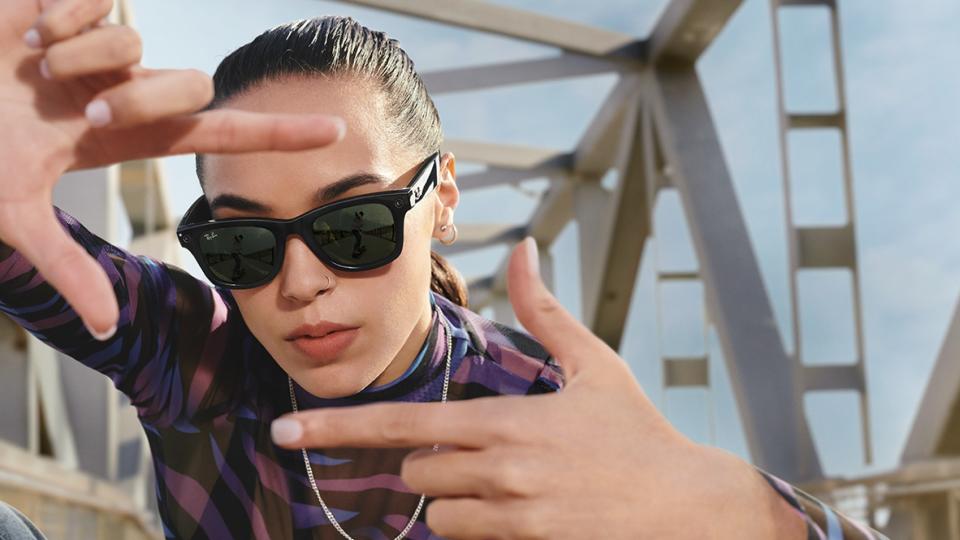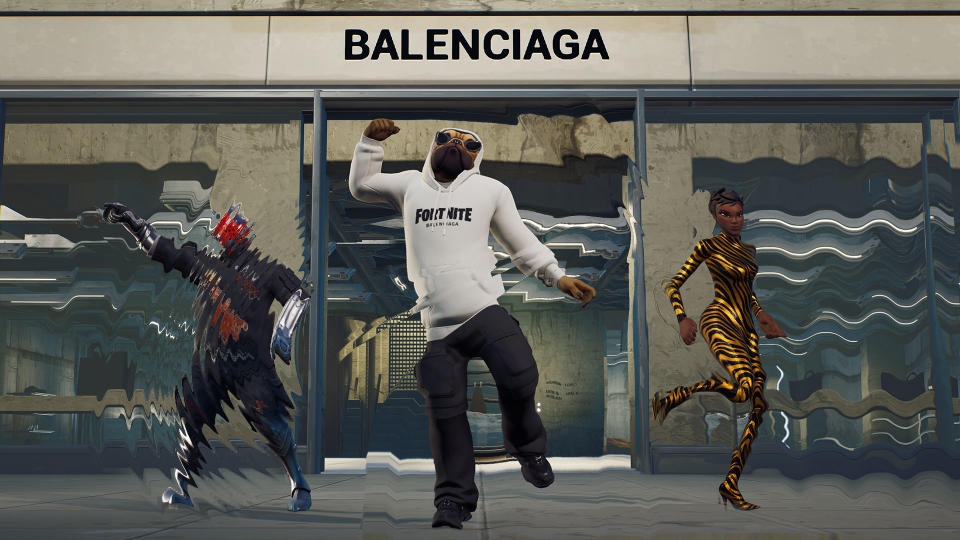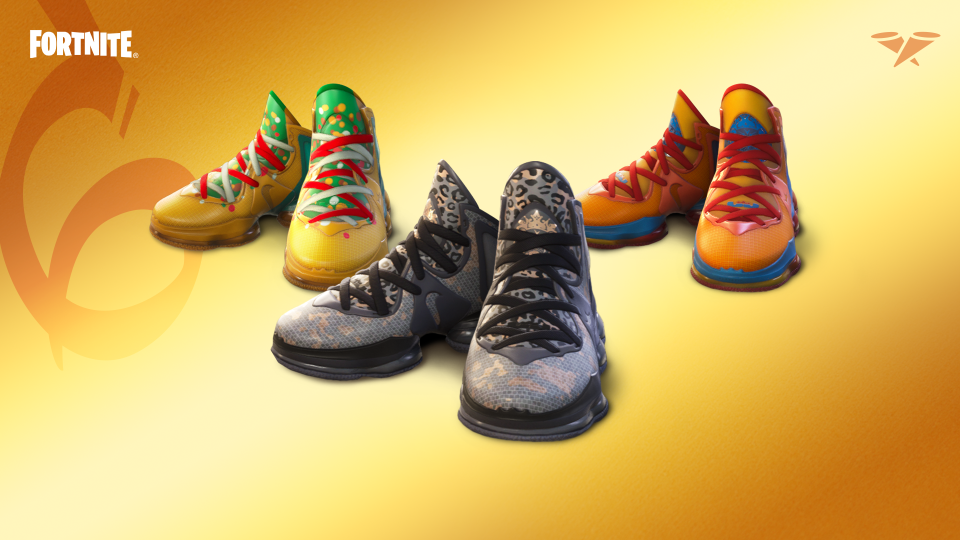Year in Review: The 10 Stories of 2021 That Set Fashion’s Course in the Metaverse

Some day, history may look at 2021 as the year everything changed for fashion’s digital business. This was the year that the metaverse came for the maisons, and the industry embraced it.
The concept — that immersive 3D virtual worlds will replace today’s internet — is not new, but the traction is. A lot of that has to do with timing.
More from WWD
Years of dabbling with Bitmoji collections, gaming avatars and Snapchat lenses set the stage, preparing design houses and brands to think in virtual terms. Those with beauty divisions also saw augmented reality’s impact on makeup sales, while luxury began battling counterfeits with blockchain, the same decentralized technology that can authenticate the ownership and exclusivity of digital goods.
In other words, brands have been heading toward NFTs and the metaverse for a long time.
This year, the foundation took shape, with important firsts and other major moves. These 10 key moments set up NFTs, the future of fashion — and perhaps beauty as well — within the metaverse.
Rtfkt Studios x Fewocious’ $3.1 Million Virtual Sneaker Drop
There were NFTs before Rtfkt’s collaboration with Fewocious, but for fashion, the moment didn’t truly arrive until word spread that a virtual sneaker collection sold for $3.1 million in February in less than seven minutes. The partners promoted the sale in advance on Snapchat, where augmented-reality lenses allowed people to try them on, and also promised physical sneakers. But they made it clear that the digital product was the real value.
By May, Rtfkt had already racked up $4.5 million in revenue, well over the $600,000 it made in all of 2020, co-founder Benoit Pagotto later told WWD.
The savvy promotion and shocking results gave the fashion industry motivation to explore the blockchain-based tech — and maybe even a road map for how to do it. Now the studio is a Nike company, about which more below.
Gucci Puts Luxury’s Stamp on NFTs with First Project
Gucci previously sold digital sneakers, but they weren’t NFTs. One sale in March transacted a mere $12. Then in May, WWD reported that the Italian brand was about to sell its first official NFT, a film inspired by the Gucci Aria fashion collection.
Christie’s online auction, Proof of Sovereignty, sold the NFT in June and for a much better price than the previous transaction, at $25,000.
The auction created buzz, as a solid indication that luxury fashion was on board with the tech. Burberry followed a couple of weeks later by announcing it would launch an NFT for a toy.
NFTs Break Into Paris Fashion Week
Fédération de la Haute Couture et de la Mode worked with French blockchain platform Arianee on NFTs for select accredited guests of the Paris spring 2022 men’s wear and haute couture shows. The tech unlocked a virtual pass to Fashion Week services and official events, as well as exclusive content such as AR experiences and digital artwork.
The Federation and Paris Fashion Week gave NFTs the industry’s most prominent platform, and wound up kicking off other moves around pivotal fashion events. A few months later, Rebecca Minkoff became the first American designer to introduce NFTs of her collection at New York Fashion Week, and in November, Roblox announced a partnership with the British Fashion Council to bring The Fashion Awards to its metaverse.
Facebook Releases Ray-Ban Stories
When Meta was still called Facebook, it struck a partnership with EssilorLuxottica to create high-tech eyewear. The result was Ray-Ban Stories, a mash-up of camera and open-air headphones introduced in September.
The gadget paves the way to chief executive officer Mark Zuckerberg’s augmented reality eyeglasses. In October, the CEO explained how pivotal the AR eyewear will be, as the lightweight, easy access to his metaverse. The move underscores an important lesson learned from his virtual reality business. Despite increasingly better VR experiences, consumer traction for Oculus hit a wall, and a major reason was the bulky headset.
The high-tech Ray-Bans matter on different fronts: It showcases Meta and Luxottica’s progress in packing sophisticated electronics into narrow spaces, previews the design sensibility informing the next AR glasses and tests whether consumers are ready to wear gadgets on their faces. As a product available now, anyone can judge these efforts for themselves.

Courtesy photo
Balenciaga x Fortnite Blurs Lines Between Physical and Digital Worlds
Balenciaga’s metaverse move was a mixed reality strategy traversing Epic Games’ Fortnite and the real world. The partners created a digital and physical capsule collection for the game based on Balenciaga’s real-world fall and spring 2021 and spring 2020 collections. To promote it, Epic used its Unreal game engine to create a 3D billboard featuring the virtual collection for cities like New York City, London, Seoul and Tokyo, among others.
This melding of efforts across real and virtual worlds, with tangible products and their digital counterparts and mixed reality marketing, may offer a template of sorts as the metaverse takes off — whenever that is. In the meantime, the brand is creating a division focused on virtual projects, similar to Diesel owner OTB’s dedicated metaverse business unit.

Courtesy Photo
Dolce & Gabbana Issues First Virtual Luxury Fashion NFT, Drawing $5.65 million
Dolce & Gabbana broke ground as the first major brand to release virtual fashion apparel via NFT in October. Its inaugural NFT collection, Collezione Genesi, included jackets, dresses and a gem-studded crown. In total, the collection sold for nearly $5.65 million on UNXD.
Red DAO bought the brand’s “The Doge Crown” NFT, which came in digital and physical forms, and two “Impossible” jackets, which offer exclusive brand experiences, for nearly $2 million. The crown alone sold for $1.27 million.
It was the first purchase for the newly formed decentralized autonomous organization, Megan Kaspar, Red DAO member and managing director of crypto investment firm Magnetic, told WWD. “For us, this was the first public signal to society [that was] sort of indicating to the world that there’s an emerging opportunity in NFT fashion that has never existed before,” she said. “It’s interesting because it shows the world what is possible with these new business models.”
Facebook Becomes Meta…and Puts “Metaverse” on Everyone’s Lips
Mark Zuckerberg has been talking the metaverse since long before he revealed Facebook’s name change to Meta in October. But it still came as a shock.
The metaverse is the “next chapter” for technology and for his company, he said, as a shared virtual environment that would replace today’s internet. With that, friends far away would feel present as they socialize, shop, work, play and more, and people would step into it using different devices, whether VR headsets or AR glasses — like the one the company is already developing.
Zuckerberg featured research teams, projects, hardware and a long list of examples to illustrate his vision. The effect was like a reverse Thanos snap, with something very nebulous suddenly materializing. Immediately, the metaverse was on everyone’s lips.
With Clinique, the Beauty Business Gets Into the NFT Game
For cosmetics and skincare companies, figuring out how to deploy NFTs is tricky. The virtual beauty experiences consumers are used to, makeup try-ons, work because intelligent systems can individualize looks to users’ faces. That means companies must get creative.
Seeing NFTs as the on-ramp to the metaverse, Clinique was motivated to figure it out. Ultimately, it went the artistic route, choosing abstract shapes in themed colors representing two marquee products and one symbolizing the company’s heritage.
Technically, Givenchy Parfums beat Clinique with an NFT project in June, but the digital artwork, which benefitted an LGBTQ cause, seemed more about philanthropy than branding. Since then, L’Oréal also jumped into NFTs, having commissioned female artists to create works. One features Reds of Worth by Colour Riche lipstick, which essentially amounts to support for a cause and branding, both.
Top Fashion School IMM Creates Metaverse Fashion Scholarship
Fashion school Istituto Marangoni Miami partnered with 3D social media company Zepeto to offer a $50,000 metaverse scholarship program. The idea is to move students into the metaverse track, ensuring a supply of fresh talent for the virtual world. Not just any virtual world, but specifically Zepeto.
The theme is obvious. Not only is the metaverse expected to arrive, but it’s expected to do so well that today’s students must train for it — and one of the world’s top fashion schools has thrown its weight behind the idea.
The South Korea-based app offers its own virtual world, with 200 million global users, and based on its fashion partnerships with names like Ralph Lauren, Gucci and Dior, luxury looks like a priority.
Nike Buys Rtfkt in Metaverse Play
In a full-circle moment, Nike announced in December that it’s acquiring Rtfkt, the crypto sneaker start-up that sparked fashion’s NFT craze in February.
The industry has been experimenting with virtual worlds and avatar fashion for years, but more as a hobby than a core part of the business. Then Rtfkt showed how exclusivity and rarity for virtual fashion can work — and be lucrative — flinging the door open to numerous possibilities, particularly for the metaverse.
That’s a key interest for Rtfkt’s new owner, which collaborated on a LeBron James Fornite collection this summer. The company added a new head of video gaming, launched a Nikeland Roblox destination and filed trademarks for virtual apparel — and that was just in November alone. If Nike, a digital-savvy brand with gaming experience, needs to “acqui-hire” metaverse expertise from a scrappy startup, other large companies are likely thinking the same thing. After all, crypto, blockchain and NFT innovators have a lot to teach established brands — like how to make millions in minutes off of products that don’t actually exist.

Courtesy Photo
Sign up for WWD's Newsletter. For the latest news, follow us on Twitter, Facebook, and Instagram.

